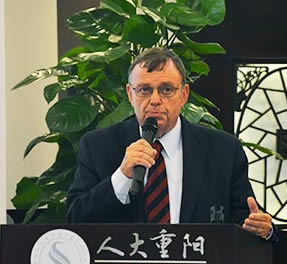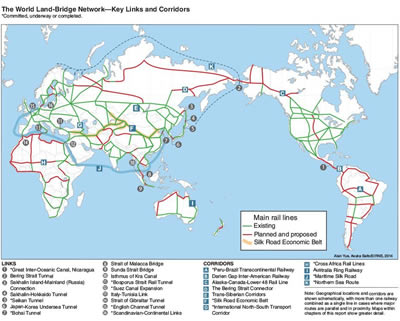Press Release
EIR’s Bill Jones Presents Need for New Paradigm
at China Scholars’ Conference
November 2015

EIR’s Bill Jones speaking at the September 2015 Beijing press conference. |
Nov. 22, 2015 (EIRNS)—Speaking at a Nov. 20-21 Shanghai round-table discussion at the World Forum of China Studies, which had gathered 300 of the top China Studies scholars from China, Europe, and North and South America on the theme, “China’s Reform Opportunities for the World,” EIR Washington correspondent Bill Jones underlined the historic importance of the Silk Road Belt proposal for the future of mankind. In his presentation entitled, “Belt and Road—A New Paradigm for Mankind,” Jones pointed to the tremendous devastation that “geopolitics” had brought to the world in the last century with two world wars, and numerous smaller wars continuing to this date.
While Roosevelt attempted with the United Nations to end the era of geopolitics, Jones said, a need made most urgent with the development of the destructive force of atomic bomb, his death prevented his project from coming to fruition. “And yet we can see with the growing tensions between the United States and Russia, and between the United States and China, that the harbingers of future military conflict between major nations have by no means been eliminated.” The win-win concept of the Belt and Road represents a different trajectory, Jones said, and a new paradigm for mankind.
 View full size EIR's World Land-Bridge proposal. |
And what can the Belt and Road bring to long-suffering humanity? he asked. “First, the emphasis on infrastructural development concentrates the focus of economic activity on the fundamental role of what my mentor and boss, Lyndon LaRouche, calls the physical economy, as counterposed to the money side of the economy. ... When people talk about economics, they think first of all of money. But money doesn’t talk. It doesn’t walk. It grows no food, and it produces no goods. Human labor provided with capital does that. Money—or finance—is only useful if it can mediate that process. Otherwise, it is only paper.” He illustrated his comments with photos of the stock market floor, first during a moment of market “irrational exuberance” and second, at the moment of a stock market crash, to make his point. Jones then noted the $2 quadrillion of debt, the payment of which was leading to the death of entire nations. A reform of the international financial system and a major write-off of the greater part of that debt was the only thing that could help revive the world economy, he said.
 |
Secondly, the Silk Road Belt could bring together—around their common interest in development, as it had in the ancient Silk Road—the diverse cultures, religions, and ethnic groups of the region. And third, it could become a transmission belt of new discoveries in science and technology.
“We should recall that during the period of the early Middle Ages, when Europe was just emerging from the barbarous Dark Ages, there was a flourishing of science and technology in the region which now encompasses the ‘One Belt, One Road.’ The great scientific centers in Iran, Uzbekistan, Syria, and India, stimulated no doubt by the work in astronomy and other sciences developed in China, became the centers of world science which would later, during the Great Renaissance of the 15th century, be transmitted to Europe.”
The Silk Road Belt could thus provide a fount of creativity where young people would become excited about mankind’s unending journey of exploration beyond our planet into the Solar System, providing hope for the younger generation in Central Asia and the Middle East, where they are now turning in desperation to extremism and terror. The support garnered for the New Silk Road project by the BRICS nations, representing roughly 40% of humanity, must now be embraced by the rest of mankind in a joint effort to realize the common aims of mankind, Jones said.
The conference, held every other year under the auspices of the Shanghai Academy of Social Sciences, received close attention by the government and the party, with a prestigious delegation addressing the plenary session, including one member of the Political Bureau of the Chinese Communist Party. According to the organizers, the forum attracted 80 different media and there were probably 2,000 people attending the different sessions. While the Silk Road Belt was itself one of the topics, the Belt and Road also intersected many of the other topics, dealing with China reform, presenting China to the world, energy policy, the “China Path,” social structure, governance, and the future of China studies.
